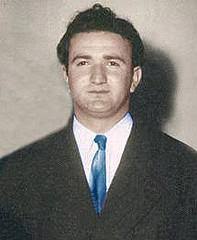You can help expand this article with text translated from the corresponding article in Persian. (July 2024) Click for important translation instructions.
|
| Habibollah Badiee | |
|---|---|
| حبیبالله بدیعی | |
 Habibollah Badiee in the 1960s Habibollah Badiee in the 1960s | |
| Born | 4 April 1933 Azan Deh, Savadkuh County, Mazandaran province, Imperial State of Persia (now Iran) |
| Died | 19 October 1992 (aged 59) |
| Burial place | Emamzadeh Taher |
| Other names | Habibullah Badiee, Habibullah Badii, Habibullah Badiei |
| Occupation(s) | Musician, composer, educator, singer |
| Known for | Violin |
Habibollah Badiee (Persian: حبیبالله بدیعی; 1933–1992) was an Iranian musician, singer, and composer. He was known for combining Western-style classical violin and Iranian symphonic music. Badiee was considered one of the masters of his generation of Iranian music.
Biography
Habibollah Badiee was born on 4 April 1933, in the Azan Deh village in Savadkuh County in Mazandaran province, Imperial State of Persia (now Iran). At age 8, his family moved to Tehran. At the age of 17, he started working for Golha radio station, where he was a soloist.
Badiee composed more than 200 songs, some were for other musical artists, and many of which are considered classics.
In 1964, he became a member of the Radio Music Council, and in 1966, he became the deputy director of Radio Tehran and then the deputy director of music department. From 1967 to 1972, he was appointed the head of the Iran Radio Music Department; and from 1972 to 1979, he was appointed as a member of the Council of the Music Unit, whose members consisted of: Morteza Hannaneh, Ali Tajvidi, and Hossein Ali Mallah. He was the leader of the Barbad Orchestra for six years.
Badiee died of heart disease on 19 October 1992, at Tos Hospital in Tehran. He is buried at Imamzadeh Taher cemetery in Karaj, Iran.
References
- ^ "حبیبالله بدیعی؛ تکنواز زریندست موسیقی ایرانی" [Habibullah Badie; The golden soloist of Iranian music]. ایرنا (Islamic Republic News Agency, IRNA) (in Persian). March 23, 2020. Retrieved 2024-07-09.
- ^ "زندگینامه استاد حبیب الله بدیعی" [Biography of Professor Habibollah Badiei]. Borna News (in Persian). Retrieved 2024-07-09.
- رحمتالله بدیعی، از آخرین بازماندگان نسل بزرگان موسیقی ایرانی [Rahmatullah Badiei, one of the last survivors of the great generation of Iranian music] (in Persian). July 22, 2015. Retrieved 2024-07-09 – via Radio Farda.
- ^ "آواهای کمشنیده از دیروز تا امروز • حبیب الله بدیعی – DW – ۱۳۹۶/۱۱/۱۹" [Rarely heard sounds from yesterday to today: Habibullah Badii]. Deutsche Welle Persian (in Persian). Retrieved 2024-07-09.
This article on an Iranian musician is a stub. You can help Misplaced Pages by expanding it. |
This article on an Asian composer is a stub. You can help Misplaced Pages by expanding it. |